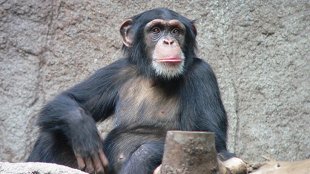 WIKIMEDIA, THOMAS LERSCHTests of spatial memory, tool use, communication, and other cognitive abilities in chimpanzees have revealed that aspects of intelligence, including general intelligence, are inherited. The results, published today (July 10) in Current Biology, complement similar findings from human studies, and lend support to the theory of general intelligence—wherein an individual’s overall cognitive prowess influences his or her more specific abilities.
WIKIMEDIA, THOMAS LERSCHTests of spatial memory, tool use, communication, and other cognitive abilities in chimpanzees have revealed that aspects of intelligence, including general intelligence, are inherited. The results, published today (July 10) in Current Biology, complement similar findings from human studies, and lend support to the theory of general intelligence—wherein an individual’s overall cognitive prowess influences his or her more specific abilities.
“This is really major evidence that . . . those estimates of the heritability of human intelligence are probably dead on,” said Alexander Weiss, a psychologist at the University of Edinburgh in the U.K., who was not involved in the study. “Anyone sensible and objective looking at this, who had any doubts about the heritability of human intelligence . . . should put those worries to rest.”
Although a great deal of evidence suggests that a person’s brainpower is in large part attributable to that of their parents, some believe environmental factors, such as socioeconomic status, are more important than genetics, said Weiss. And resolving that debate hasn’t been easy. “One of the challenges in the human intelligence literature is that it is very difficult ...














